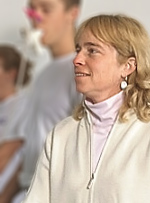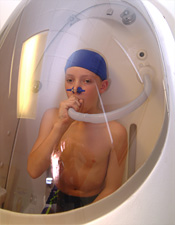ESS Professor Stoedefalke Discusses Children and Exercise
 Kerstin Stoedefalke, associate professor of Exercise and Sport Sciences and Natural Sciences, recently completed a sabbatical to continue her research on children and exercise. She spent the spring 2006 semester in the United Kingdom at the University of Exeter Children's Health and Exercise Research Centre, where she has been part of the research team for nearly 10 years.
Kerstin Stoedefalke, associate professor of Exercise and Sport Sciences and Natural Sciences, recently completed a sabbatical to continue her research on children and exercise. She spent the spring 2006 semester in the United Kingdom at the University of Exeter Children's Health and Exercise Research Centre, where she has been part of the research team for nearly 10 years.
Please describe the nature of the research you conducted during your sabbatical leave.
My primary research revolves around exercise and children. I am currently conducting a six-year longitudinal study examining heart size, fitness and training in competitive young swimmers. I have started with a group of nine and ten-year old boys and girls and will be collecting the second year of test data this May.
I did a five-week pilot study examining the effects that swim volume has on resting heart rate, 50-meter swim time and motivation towards swimming in 12- to 15-year-old boys and girls.
What do you view as the most important aspects of your work?
I think the first most important aspect is the connection made with the coaches, parents and young athletes. Because this is a six-year study, it's important that I develop a relationship with the athletes that will “give back to them.” I do this by sending them pictures of their testing sessions, and providing them with nutritional and hydration advice and correspondence about the next steps of the study.
 I provide physiological advice to the coaches and personal training/nutritional advice to the swimmers if requested. I invite the parents to all testing sessions. While there, I explain the tests we are running and the potential benefits their young athlete can gain from the results.
I provide physiological advice to the coaches and personal training/nutritional advice to the swimmers if requested. I invite the parents to all testing sessions. While there, I explain the tests we are running and the potential benefits their young athlete can gain from the results.
From a more global perspective, this will be the first longitudinal study that will examine training effects in young athletes. I am hopeful the results can be used to help promote safe and effective training regimes for young competitors.
Were there unexpected discoveries along the way? What was most challenging for you?
So far I do not have year two of the data from the longitudinal study. From the pilot study, I was surprised to see that swim volume did not have an effect on physiological variables. However, we did find that there is a very diverse range of motivations for the young athlete to “swim.” This pilot study is what prompted the longitudinal study.
The biggest challenge: keeping the kids, parents and coaches as motivated about the study as I am!
How did you initially become interested in this area of research?
I started my competitive life as a six-year old speed skater in Madison, Wis. I have a love for exercise and competition and had many fun years playing sport. However, I feel that much the “child has been taken out of children's sports.” I am hoping through my research to help keep youth competition a fun experience for the competitor.

How do you think your sabbatical experience will enhance your work as a faculty member?
I find that I am able to bring alive my research in the class room. I am able to share laboratory experiences that apply to real life situations. In addition, my research is in the UK which means I have a network of colleagues that extends across the Atlantic.
Although certainly “western culture” there are many differences between the way we operate in the U.S. compared to the U.K. I find I am able to learn from these experiences and translate the experience into a more diversified classroom for my students.
Do you have plans to share your research with the campus community and to continue work in this area?
Since my return in September I have shared my experience at the sabbatical dinner and presented my research at the bio seminar. I find that pretty much weekly, I bring examples of my research into the classroom.
Viewing the sabbatical leave as a learning experience, what were some of the enduring lessons for you?
A sabbatical is a lot of work. Although it is enjoyable work, the responsibility of carrying a study over six years can sometimes be overwhelming. I have already been back to the U.K. on two occasions to collect data and plan to go for a month after Commencement.
Is there anything else you'd like to add?
I already feel very privileged to be a faculty member at Colby-Sawyer. The opportunity to have a sabbatical is the true icing on the cake!


